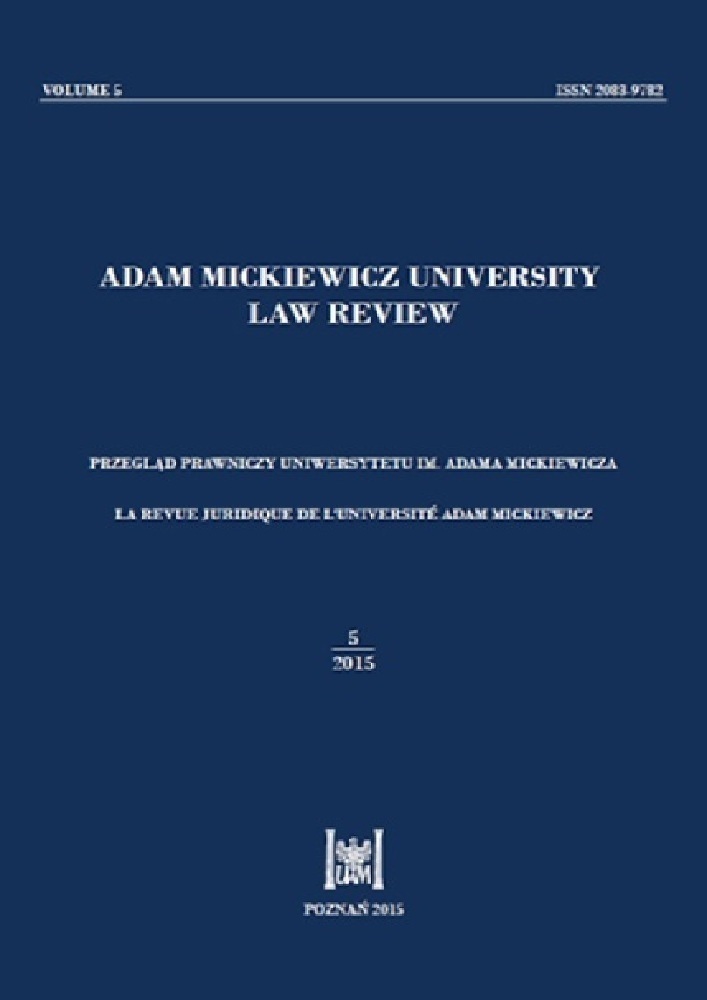Abstract
Futile care encompasses a range of medical procedures that serve to sustain the vital functions of a terminally ill person, thus prolonging their dying process. This paper aims primarily to arrive at a legal and ethical characterization of the institution of futile care. In the light of pertinent laws in other countries (the United Kingdom, Italy), the authors demonstrate that it is necessary to take legislative action concerning futile care in Poland, including e.g. the institution of advanced decision and lasting power of attorney. There are certain obstacles to introducing legal norms that pertain to futile care. For one thing its normative definition is lacking while the applicable law, such as the Act on the Medical Profession, imposes an obligation on the physician to provide medical assistance in each case where delay could expose the patient to the risk of loss of life, grievous bodily injury or serious disturbance of health.
Funding
This paper has been developed as part of the project financed through Excellence Initia tive – Research University Study@research competition no. 118/34/ID-UB/0041, with prof. UAM dr hab. Katarzyna Kokocińska as supervisor.
References
Age UK. “Advance Decision, Advance Statements and Living Wills.” Factsheet, no. 72(2023).
Bell, Dominic. “The Legal Framework for End of Life Care: A United Kingdom Perspective.” Intensive Care Medicine 33, no. 1(2007): 158–62. DOI: https://doi.org/10.1007/s00134-006-0426-9
Bołoz, Wojciech, Małgorzata Krajnik, and Anna Adamczyk et al. “Definicja Uporczywej Terapii. Konsensus Polskiej Grupy Roboczej ds. Problemów Etycznych Końca Życia,” Medycyna Paliatywna w Praktyce 2, no. 3(2008): 77.
Centrum Badania Opinii Społecznej. Komunikat z badań. Zaniechanie uporczywej terapii a eutanazja. Fundacja Centrum Badania Opinii Społecznej, 2013.
Di Paolo, Marco, Federica Gori, Luigi Papi, and Emanuela Turillazzi. “A Review and Analysis of New Italian Law 219/2017: ‘Provisions for Informed Consent and Advance Directives Treatment’.” BMC Medical Ethics 20, 1(2019): article 17. DOI: https://doi.org/10.1186/s12910-019-0353-2
General Medical Council. “Legal Annex.” https://www.gmc-uk.org/professional-standards/the-professional-standards/treatment-and-care-towards-the-end-of-life/legal-annex.
Koka, Enkelejda, and Denard Veshi. “A New Law of ‘Living Will’ in Italy: A Critical Analysis.” Liverpool Law Rev, no. 40(2019): 113–30. DOI: https://doi.org/10.1007/s10991-019-09224-0
Kübler, Andrzej, Jacek Siewiera, Grażyna Durek, Krzysztof Kusza, Mariusz Piechota, and Zbigniew Szkulmowski. “Wytyczne postępowania wobec braku skuteczności podtrzymywania funkcji narządów (terapii daremnej) u pacjentów pozbawionych możliwości świadomego składania oświadczeń woli na oddziałach intensywnej terapii,” Anestezjologia Intensywna Terapia 46, no. 4(2014): 229–34 DOI: https://doi.org/10.5603/AIT.a2014.0038
Menal Health Foundation. “Mental Capacity.” https://www.mentalhealth.org.uk/explore-mental-health/a-z-topics/mental-capacity.
Rzecznik Praw Pacjenta. Standardy postępowania w terapiach medycznych stosowanych w okresie kończącego się życia. Rzecznik Praw Pacjenta, 2021.
Szczeklik Wojciech, Małgorzata Krajnik, Jakub Pawlikowski et al. “Zapobieganie terapii daremnej u dorosłych chorych umierających w szpitalu – stanowisko Grupy Roboczej Towarzystwa Internistów Polskich ds. Terapii Daremnej na Oddziałach Internistycznych. Część 1: chory umierający nieubezwłasnowolniony, niebędący w stanie podejmować świadomych decyzji co do leczenia w sytuacji daremności medycznej stosowanej terapii.” Medycyna Praktyczna, no. 4(2023): 121–40.
Siewiera, Jacek, and Andrzej Kübler. Terapia daremna dla lekarzy i prawników. Edra Urban & Partner, 2015.
Świderska, Małgorzata A. “Aspekty prawne terapii daremnej w okresie końca życia,” Białostockie Studia Prawnicze 28, no. 3(2023): 71–107. DOI: https://doi.org/10.15290/bsp.2023.28.03.04
Taggart, John. “Powers of Attorney and ‘Lack of Capacity’ under the Mental Capacity Act 2005: A Narrowing of the s 44 Offence? R v Kurtz [2018] EWCA Crim 2743.” The Journal of Criminal Law 84, no. 1(2020): 74–82. DOI: https://doi.org/10.1177/0022018319883146
Triberti, Cesare, and Maddalena Castellani. Libera Scelta sul fine vita. Il testament biologico. Commento alla Legge n.219/2017 in materia di consenso informato e dispozioni anticipate di trattamento. goWare, 2018.
Veshi, Denard. “End-of-Life Decisions in Italy: An Overview of the Currentsituation.” Liverpool Law Rev, no. 38(2017): 231–42. DOI: https://doi.org/10.1007/s10991-017-9200-z
Zagórski, Sławomir. O zaniechaniu uporczywej terapii i reanimacji. Czekamy na dobre prawo. OKO.press. Published February 21, 2024. https://oko.press/o-zaniechaniu-uporczywej-terapii-i-reanimacji-czekamy-na-dobre-prawo.
Zamperetti, Nereo, and Rodolfo Proietti. “End of Life in the ICU: Laws, Rules and Practices: The Situation in Italy.” Intensive Care Medicine, no. 32(2006): 1620–22. DOI: https://doi.org/10.1007/s00134-006-0330-3
Decision of the Supreme Court of the Republic of Poland of 27 October 2005, III CK 155/05.
Airedale NHS Trust v. Bland, Great Britain, House of Lords.
Re J (A Minor) (Wardship: Medical Treatment), Great Britain, England, Court of Appeal, Civil Division.
Re Ms B v. a NHS Hospital Trust [2002] EWHC 429 (Fam), United Kingdom High Court of Justice.
License
Copyright (c) 2024 Oliwia Czajkowska, Natalia Robak

This work is licensed under a Creative Commons Attribution 4.0 International License.

